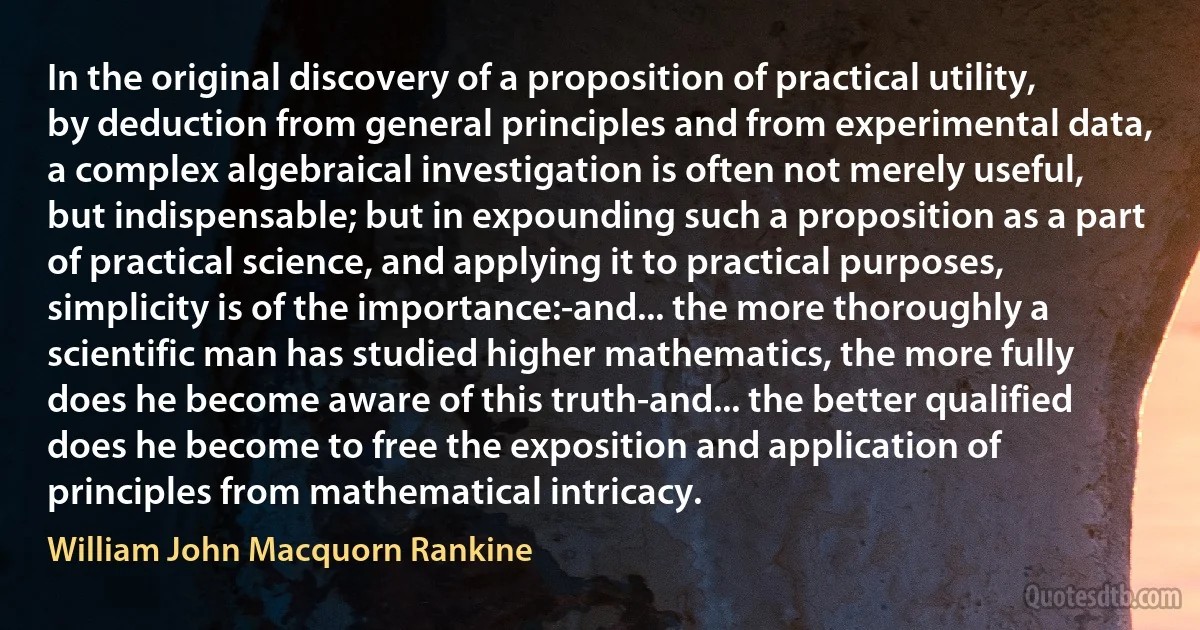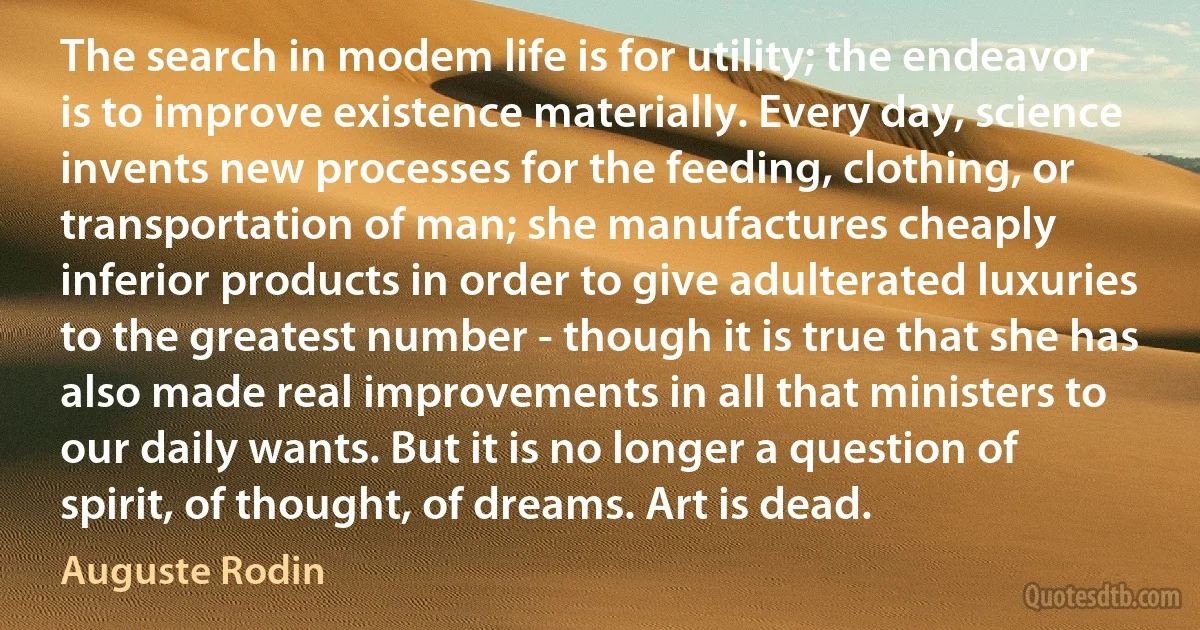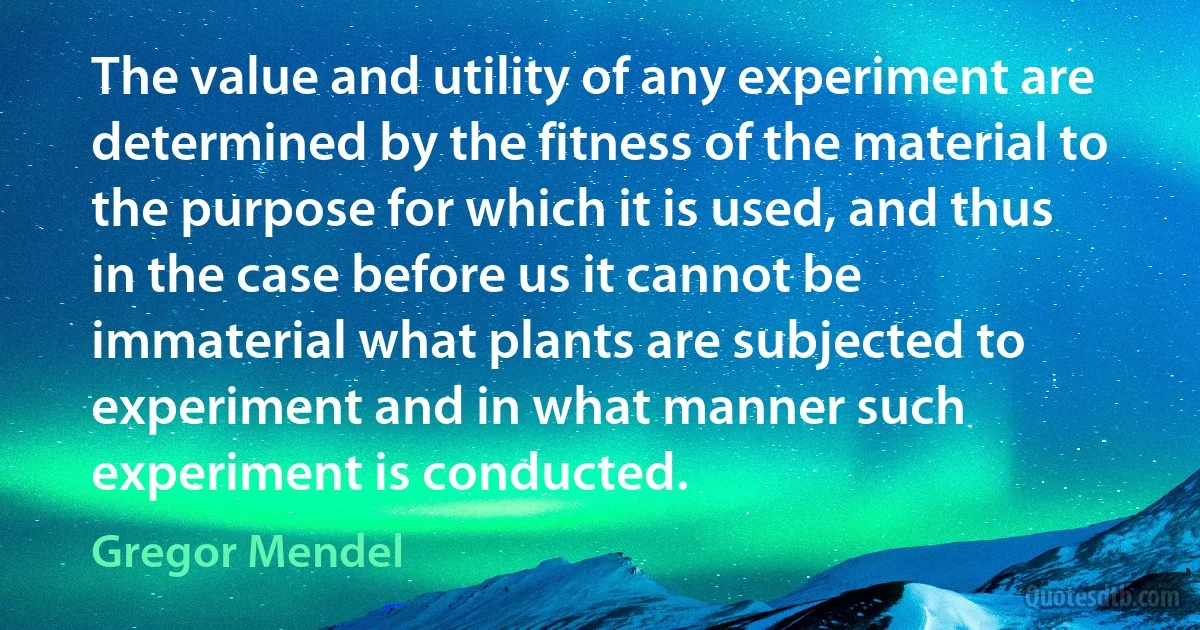Utility Quotes - page 4
Above all, Fascism, in so far as it considers and observes the future and the development of humanity quite apart from political considerations of the moment, believes neither in the possibility nor the utility of perpetual peace. It thus repudiates the doctrine of Pacifism - born of a renunciation of struggle and an act of cowardice in the face of sacrifice. War alone brings up to its highest tension all human energy and puts the stamp of nobility upon the people who have the courage to meet it. All other trials are substitutes, which never really put a man in front of himself in the alternative of life and death.

Benito Mussolini
Defined by its purpose, its [education's] main aim is not to impart the specialized technique of any particular trade or profession, but to develop the faculties which, because they are the attribute of man, are not peculiar to any particular class or profession of men, and to build up the interests which, while they may become the basis of specialization at a later stage, have a value extending beyond their utility for any particular vocation, because they are the condition of a rational and responsible life in society.

R. H. Tawney
Nonsatiation (Smith, 1976a). Given a costless choice be ween two alternatives which differ only in that the first yields more of the reward medium (e. g., currency) than the second, the first will always be chosen (preferred) over the second by an autonomous individual, i. e., utility U(M) is a monotone increasing function of the reward medium.

Vernon L. Smith
Any corporation selling us products on the basis of anything other than utility should be revoked and shut down. Any corporation that at this time of fast-diminishing resources designs products that have in-built doomsday devices, planned obsolescence, should be shut down. All this glamour and clamor and blagging and skanking has to end.

Russell Brand
The social rootedness of science is often associated with the utility of applied science; this is an error and a dangerous error. But precisely the detachment of the theoretical scientist is rooted in the institutions of his society and in the evaluative choices which underlie those institutions. He can focus his whole attention, bringing every relevant clue to bear, on a problem wholly without appetitive or utilitarian implications, he can put his whole heart and mind into the search for understanding for the sake of understanding alone. How can he do this? First, because he himself has been nourished and disciplined by traditions cultivated within his society which have produced this kind of devoted attention to impersonal goals. And secondly, because the society itself, in its deepest foundations, respects those independently self-sustaining traditions of scientist or scholar.

Marjorie Grene
It's universally wrong to steal from your neighbor, but once you get beyond the-one-to-one level and pit the individual against the multinational conglomerate, the federal bureaucracy, the modern plantation of agro-buinsess, or the utility company, it becomes strictly a value judgement to decide exactly who is stealing from whom. One person's crime is another person's profit. Capitalism is license to steal; the government simply regulates who steals an how much. I always wanted to put together an outlaw handbook that would help raise consciousness on these points while doing something about evening the score. There was also the challenge of testing the limits of free speech.

Abbie Hoffman
One of the most important axioms is, that as the quantity of any commodity, for instance, plain food, which a man has to consume, increases, so the utility or benefit derived from the last portion used decreases in degree. The decrease in enjoyment between the beginning and the end of a meal may be taken as an example.

William Stanley Jevons
One of the most important axioms is, that as the quantity of any commodity, for instance, plain food, which a man has to consume, increases, so the utility or benefit derived from the last portion used decreases in degree. The decrease in enjoyment between the beginning and the end of a meal may be taken as an example. And I assume that on an average, the ratio of utility is some continuous mathematical function of the quantity of commodity. This law of utility has, in fact, always been assumed by political economists under the more complex form and name of the Law of Supply and Demand. But once fairly stated in its simple form, it opens up the whole of the subject.

William Stanley Jevons
A rolling back of the frontiers of State surveillance is necessary. ... I have come to the conclusion that this side of MI5 has become more trouble than it is worth. It falls over its own feet too often. It arouses more suspicion and complaint than is justified by the results its achieves. ... On grounds of utility I would now close down the political side of its activities.

Roy Jenkins
Because we cannot by ourselves give sufficient thanks to God, our creator, for the grace, honour, health and success that He has granted us thus far, nor amass sufficient merit to secure the continuation of His grace in the future... to beseech God to continue to raise us in virtue and good customs, to govern our dominions and subjects in peace, union and concord, and to guide our affairs to His honour, our wellbeing, and the prosperity, utility and tranquility of our said dominions and subjects.

Charles V, Holy Roman Emperor
Among the various paradigmatic changes in science and mathematics in this century, one such change concerns the concept of uncertainty. In science, this change has been manifested by a gradual transition from the traditional view, which insists that uncertainty is undesirable in science and should be avoided by all possible means, to an alternative view, which is tolerant of uncertainty and insists that science cannot avoid it. According to the traditional view, science should strive for certainty in all its manifestations (precision, specificity, sharpness, consistency, etc.); hence, uncertainty (imprecision, nonspecificity, vagueness, inconsistency, etc.) is regarded as unscientific. According to the alternative (or modem) view, uncertainty is considered essential to science; it is not only an unavoidable plague, but it has, in fact, a great utility.

George Klir
We must therefore glean up our experiments in this science from a cautious observation of human life, and take them as they appear in the common course of the world, by men's behaviour in company, in affairs, and in their pleasures. Where experiments of this kind are judiciously collected and compared, we may hope to establish on them a science, which will not be inferior in certainty, and will be much superior in utility to any other of human comprehension.

David Hume
Let men learn (as we have said above) the difference that exists between the idols of the human mind, and the ideas of the Divine mind. The former are mere arbitrary abstractions; the latter the true marks of the Creator on his creatures, as they are imprinted on, and defined in matter, by true and exquisite touches. Truth, therefore, and utility are here perfectly identical.

Francis Bacon
People in eastern Congo are massacred to facilitate smart phone upgrades of ever diminishing marginal utility. Forests are felled to make "personalised heart shaped wooden cheese board sets”. Rivers are poisoned to manufacture talking fish. This is pathological consumption: a world-consuming epidemic of collective madness, rendered so normal by advertising and the media that we scarcely notice what has happened to us.

George Monbiot
This shows what we already know: belief may arise by indoctrination or authority, but is often maintained by social utility. But if no conceivable evidence can shake your faith in a theistic God, then you've deliberately removed yourself from rational discourse. In other words, your faith has trumped science.

Jerry Coyne
The new governmental reason does not deal with what I would call the things in themselves of governmentality, such as individuals, things, wealth, and land. It no longer deals with these things in themselves. It deals with the phenomena of politics, that is to say, interests, which precisely constitute politics and its stakes; it deals with interests, or that respect in which a given individual, thing, wealth, and so on interests other individuals or the collective body of individuals. ... In the new regime, government is basically no longer to be exercised over subjects and other things subjected through these subjects. Government is now to be exercised over what we could call the phenomenal republic of interests. The fundamental question of liberalism is: What is the utility value of government and all actions of government in a society where exchange determines the value of things?

Michel Foucault



